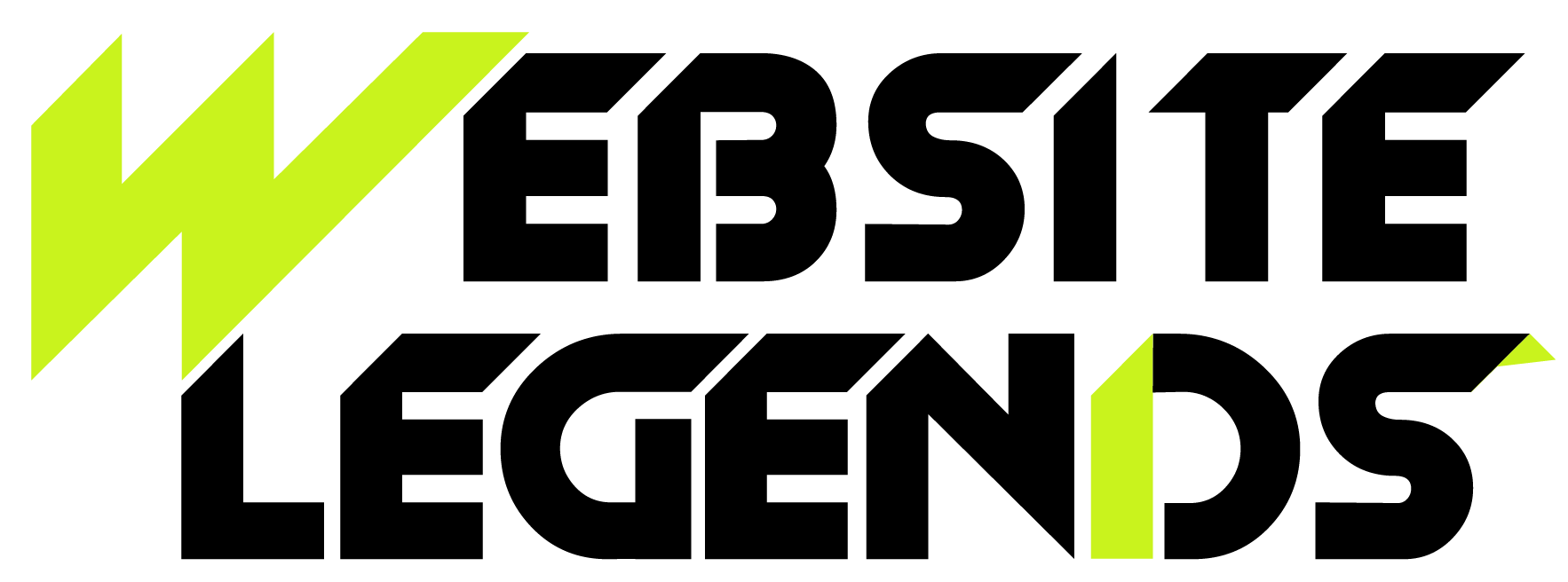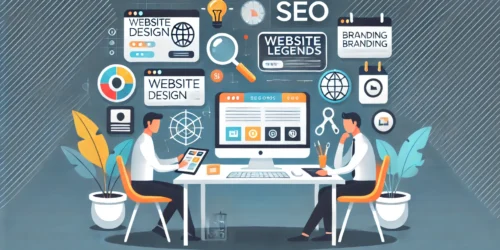We are Legends in web Design and
dEVELOPMENT







Invest In Your GoalsTURN YOUR BRILLIANT IDEA INTO A DIGITAL SUCCESS STORY!

32k+
happy clients of our Services
Craft a powerful brand identity with our web strategists and designers equipped with relevant skills to create an experience that resonates with emotions! Why us? Because we deliver impactful processes that guarantee results!



Make your business prosper with our great team of experts. We’ll make your 1.8.
1.8x
Faster Service

Make Your Business Prosper with Experts Who Deliver
Make Your Business Prosper with Experts Who Deliver
Our professional team is committed to innovation, efficiency, and quality.
We streamline your web solutions to ensure maximum impact.

Logo Designing
Craft a unique, memorable logo that defines your brand identity and leaves a lasting impression.
Web Development
Build responsive, high-performance websites designed for seamless user experience and maximum conversions.
Ecommerce Development
Create a feature-rich, secure, and scalable online store optimized for sales and growth.
Search Engine Optimization (SEO)
Boost search rankings, drive organic traffic, and enhance online visibility with expert SEO strategies.
Social Media Marketing
Engage, grow, and convert audiences with powerful social media strategies tailored to your brand.
Video Animation
Captivate your audience with engaging, high-quality animated videos that tell your brand story.
Empowered With Skills, Dedicated to Help YOU!
Reinforce your brand with legends powered by skills and a track record of agile performance, fast delivery, and results that are worth bragging about!
Innovative Solutions
We stay ahead of industry trends to provide cutting-edge services that set your brand apart.
Client-Centric Approach
Understanding your business challenges and goals is our priority, enabling us to deliver personalized strategies that drive results.
Proven Expertise
With a track record of successful projects across diverse industries, our adroit team is equipped to handle diverse digital needs.
Cost effective
Add the best talent on the market, an agile skilled management & seamless involvement.
+

Year
00K
Project Completed
00
Team Member
00
Awards Winning
00K
Happy Customer
Our Packages
- Logo Design
- Web Design
- Ecommerce
- Video Animation
- Branding
- SEO
Logo Basic
Package
$59.99
$69.99
ONLY
- 3 Original Logo Concepts
- 1 Dedicated Logo Designer
- 4 Revisions
- Formats: JPEG Only
- 24 - 48 Hours Turn Around Time
- 100% Satisfaction
- Money Back Guarantee
- Dedicated Account Manager
Speak with us
Want to discuss?
Professional Logo Package
$199.99
$259.99
ONLY
- 8 Original Logo Concepts
- 3 Dedicated Logo Designer
- Unlimited Revisions
- With Grey Scale Format
- Formats: JPEG, PSD, PNG, TIFF, SVG
- 24 - 48 Hours Turn Around Time
- 100% Ownership Rights
- 100% Satisfaction
Speak with us
Want to discuss?
Corporate Logo Package
$399.99
$449.99
ONLY
- 12 Original Logo Concepts
- 5 Dedicated Logo Designer
- Unlimited Revisions
- Stationery Design (Business Card, Letterhead, Envelope)
- Email Signature Design
- With Grey Scale Format
- Free Icon Design
- MORE FEATURES
Speak with us
Want to discuss?
Basic Website
Package
$399.99
$499.99
ONLY
- 3 Page Website
- Custom Layout Design
- Contact/Query Form
- 1 Banner Design
- 2 Stock Photos
- FREE Favicon Design
- Cross Browser Compatible
- Complete W3C Certified HTML
- Website Initial Concepts in 48 Hours
- Complete Design & Deployment
- Complete Source Files
- Dedicated Project Manager
- 100% Ownership Rights
- 100% Satisfaction Guarantee
- Mobile Responsive will be Additional $200*
- CMS will be Additional $250*
- *NO ANY HIDDEN FEE*
Speak with us
Want to discuss?
Startup Website
Package
$799.99
$999.99
ONLY

- 5 Page Website
- Custom Layout Design
- Contact/Query Form
- 3 Banner Designs
- 5 Stock Photos
- FREE Favicon Design
- FREE Google Friendly Sitemap
- Unlimited Revisions
- Complete W3C Certified HTML
- Website Initial Concepts in 48 Hours
- Complete Design & Deployment
- Complete Source Files
- Dedicated Project Manager
- 100% Ownership Rights
- 100% Satisfaction Guarantee
- Value Added Services
- Mobile Responsive will be Additional $200*
- CMS will be Additional $250*
- *NO ANY HIDDEN FEE*
Speak with us
Want to discuss?
Professional Website Package
$1199.99
$1299.99
ONLY
- Up to 10 Unique Pages Website
- CMS /Admin Panel Integration
- 5+ Stock Photos & Banner Designs
- FREE Social Media Integration
- FREE Favicon Design
- FREE Google Friendly Sitemap
- Unlimited Revisions
- Cross Browser Compatible
- Complete W3C Certified HTML
- Website Initial Concepts in 48 Hours
- Complete Design & Deployment
- Custom, Interactive & Dynamic Web Design
- Industry specified Team of Expert Designers and Developers
- Complete Source Files
- Dedicated Project Manager
- 100% Ownership Rights
- 100% Satisfaction Guarantee
- Value Added Services
- Mobile Responsive will be Additional $200*
- CMS will be Additional $250*
- *NO ANY HIDDEN FEE*
Speak with us
Want to discuss?
Basic E-Commerce Package
$498.00
$698.00
ONLY
- Customized Design
- Up-to 50 Products
- Mini Shopping Cart Integration
- Payment Module Integration
- Easy Product Search
- Dedicated designer & developer
- Unlimited Revisions
- 100% Satisfaction Guarantee
Speak with us
Want to discuss?
Startup E-Commerce Package
$998.95
$1198.95
ONLY
- Customized Design
- Up-to 100 Products
- Content Management System
- Mini Shopping Cart Integration
- Dedicated designer & developer
- Unlimited Revisions
- 100% Money Back Guarantee
- Easy Product Search
Speak with us
Want to discuss?
E-Commerce Professional Package
$3,195.00
$4,195.00
ONLY
- Customized Design
- Up-to 500 Products
- Content Management System
- Full Shopping Cart Integration
- Payment Module Integration
- 5 Promotional Banners
- Team of Expert Designers & Developers
- 100% Money Back Guarantee
Speak with us
Want to discuss?
Teaser Package
$499.99
$699.99
ONLY
- 15 Second Video - HD 1080
- Professional Script
- Storyboard
- Professional Voice-Over & Sound Effects
- Animation
- Custom Artwork
- Background Music
- Unlimited Storyboard Revisions
Speak with us
Want to discuss?
Startup Package
$799.99
$999.99
ONLY
- 30 Second Video - HD 1080
- Professional Script
- Storyboard
- Animation
- Professional Voice-Over & Sound Effects
- Background Music
- Sample Theme
- Unlimited Storyboard Revisions
Speak with us
Want to discuss?
Premium Package
$999.99
$249.99
ONLY
- 90 Second Video - HD 1080
- Professional Script
- Storyboard
- Animation
- Professional Voice-Over & Sound Effects
- 2D Character Illustration
- 24x7 Support
- Moneyback Guarantee
- FREE All File Formats
Speak with us
Want to discuss?
Basic Package
$249
$349
ONLY
- 1 Complete Stationary Layout
- 1 Business Card Concept
- 1 Letterhead Concept
- 1 Envelope Design
- Multiple File Format(Ai, PNG, JPEG)
- Turn around time 24 - 48 Hours
- 100% Satisfaction Guaranteed*
- Add on: $30 for 24 - 48 Hours Rush Delivery
Speak with us
Want to discuss?
Advanced Package
$499
$599
ONLY
- 2 Complete Stationary Layouts
- 2 Business Card Concept
- 2 Letterhead Concept
- 2 Envelope Design
- Unlimited Revisions
- Turn around time 24 - 48 Hours
- Add on: $60 for 24 - 48 Hours Rush Delivery
- 2 Envelope Design
Speak with us
Want to discuss?
Business Package
$1299
$1399
ONLY
- 3 Complete Stationary Layouts
- 3 Business Card Concept
- 3 Letterhead Concept
- 3 Envelope Design
- Icon Design
- MS Letter Head Design
- Fax Template
- Turn around time 24 - 48 Hours
- Add on: $90 for 24 - 48 Hours Rush Delivery
Speak with us
Want to discuss?
Foundational SEO
Package
$1,250
$2,250
ONLY
- 3 months Contract Ideal for e-commerce websites
- Business & Goal(s) Understanding
- Technical Audit and Suggestions of Fixes
- Analytics Implementation and Call Tracking
- Schema Markup Implementation
- On-Page SEO Suggestions & Implementation
- Monthly Report
- Add on: $30 for 24 - 48 Hours Rush Delivery
Speak with us
Want to discuss?
Core SEO
Package
$2,050
$3,050
ONLY
- 6 Month Contract Ideal for websites with 30+ pages
- Business & Goal(s) Understanding
- Keyword(s) Research
- Analytics Implementation and Call Tracking
- Schema Markup Implementation
- On-Page SEO Suggestions & Implementation
- Monthly Report
- Next Month’s Plan of Action
- Add on: $60 for 24 - 48 Hours Rush Delivery
Speak with us
Want to discuss?
Core E-Commerce Package
$3,600
$4,600
ONLY
- 1 Year Contract Ideal for e-commerce websites
- Includes All Core SEO Features
- Persona Research and CRO Fixes
- A/B Testing (if required)
- AMP Pages
- Events-Based Campaigns
- E-commerce Analytics and Call Tracking
- Email Marketing Suggestions
- Next Month’s Plan of Action
Speak with us
Want to discuss?
Do You Have Any
Project?
Get In Touch
Frequently Asked Questions
Confused? Find the answer to your flustering question in our FAQ section!
At Website Legends, we prioritize your business goals, brand identity, and long-term growth. If you're looking for a high-quality, custom website that is both visually stunning and strategically designed to increase traffic and conversions, we are the perfect partner. Our expertise in branding, SEO, digital marketing, and video animation ensures that your entire online presence is strong and cohesive. We take the time to understand your business, offer customized solutions, and deliver measurable results.
When choosing a web development and branding agency, consider the following:
- Experience & Portfolio – Check their past projects to see if their work aligns with your vision.
- Industry Expertise – Ensure they understand your industry's needs and challenges.
- Comprehensive Services – A great agency offers web design, branding, SEO, and marketing under one roof.
- Customization – Avoid one-size-fits-all solutions; choose an agency that tailors everything to your business.
- Support & Maintenance – Ensure they offer ongoing support to keep your site updated and secure.
- Client Testimonials – Read customer reviews to see what others say about their experience.
Absolutely! If you're evaluating multiple web development companies, we can guide you through the process by:
- Providing a free consultation to discuss your needs and options.
- Explaining the pros and cons of different website platforms and technologies.
- Offering transparent pricing and project timelines so you can compare effectively.
- Helping you understand what features and services are essential for your business.
We believe in honest guidance, ensuring you make the best decision—even if it's not with us!
Testimonial
Trusted By 5k+ Clients
Unable to trust us? Let our work and client testimonials do the talking for you!
Website Legends transformed our online presence! Their team built an incredible website that truly represents our brand. Their digital marketing and video animation services assisted us to reach a wider audience and increase engagement. Professional, creative, and reliable.

Website Legends did an outstanding job revamping our website and branding. Their team's creativity, attention to detail, and expertise in digital marketing made a huge impact. The video animations they created were top-notch. Couldn't have asked for a better partner!

Website Legends transformed our outdated site into a stunning, modern platform. Their attention to detail and user experience was impressive. Every feature works seamlessly across devices. We’re proud to have a website that truly represents our brand.

Their digital marketing services helped us reach a wider audience quickly. We saw increased engagement and better conversion rates within weeks. The team knew exactly how to position our brand online. Highly professional and results-driven approach.

The website they built for us was clean, fast, and visually appealing. From start to finish, their team stayed responsive and helpful. They brought our ideas to life better than we imagined. We highly recommend Website Legends to any growing business.

Website Legends created incredible video animations for our product launch. The visuals were engaging and helped explain our service clearly. Our audience loved the creativity and clarity. It added real value to our marketing efforts.

Working with Website Legends was smooth from day one. They understood our goals and delivered exactly what we needed. The end result was a site that feels professional and easy to use. Their team exceeded all our expectations.

Our social media engagement skyrocketed after their marketing team stepped in. They crafted smart, targeted campaigns that got results. Communication was clear, timely, and effective. Website Legends knows how to make an impact online.

They built a website that not only looks great but performs flawlessly. Fast loading times and a mobile-friendly layout made a big difference. Their development team was skilled and efficient. We couldn't be happier with the outcome.

The animation work from Website Legends was absolutely top-notch. They added energy and clarity to our brand message. Every video felt custom-made for our audience. We received great feedback from clients and customers alike.

Website Legends gave our brand a strong online identity. They combined creativity with strategy in every detail. Our website is now our strongest marketing tool. Truly a team that understands modern branding.

Goladria Kim
Fashion Designer
I highly recommend them!

Karen Hills
Fashion Designer
The video animations

Blog & Article
Explore Blog & article
Have a look at the current trends and general insights of the industry and how the
IT industry is evolving
with Website Legends expertise.
Топ 5 1хБет слотов с высоким волатильностью для смелых игроков
Топ 5 1хБет слотов с высоким волатильностью для смелых игроковВ этом статье мы рассмотрим топ-5 слотов с высоким...
Navigace světem casino bonusy a promoakcí
Navigace světem casino bonusy a promoakcíV dnešní digitální době se stává čím dál složitějším orientovat se v různých...
Как настроить параметры безопасности в 1xbet мобильное приложение
Как настроить параметры безопасности в 1xbet мобильное приложениеБезопасность игроков – важный аспект в мире онлайн-ставок, особенно в таких...
By: admin
March, 2025
How Brands Are Adapting to a Post-Cookie World with
The digital marketing world is undergoing a major transformation as third-party cookies phase out.
Топ 5 1хБет слотов с высоким волатильностью для смелых игроков
В этом статье мы рассмотрим топ-5 слотов с высоким уровнем волатильности на платформе 1хБет, которые подойдут для смелых игроков. Высокая волатильность означает большую степень риска, но также и возможность выиграть значительные суммы. Эти слоты идеально подойдут для тех, кто ищет сильных эмоций и острых ощущений во время своей игровой сессии. Мы тщательно отобрали слоты, которые не только предлагают щедрые выигрыши, но и уникальные игровые механики. Давайте погрузимся в мир высоких ставок и узнаем, какие слоты заслуживают вашего внимания.
1. Book of Ra Deluxe
Первым в нашем списке слотов с высокой волатильностью является классический “Book of Ra Deluxe”. Эта игра предлагает игрокам уникальную возможность отправиться в увлекательное приключение по древнему Египту. В игре присутствуют специальные символы и функции, которые позволяют значительно увеличить выигрышные комбинации. Вот несколько причин, почему стоит выбрать этот слот:
- Максимальный выигрыш: до 5000x ставки.
- Бонусный раунд с бесплатными спинами и расширяющимися символами.
- Уникальная атмосферная графика и звуковое сопровождение.
2. Gonzo’s Quest
Следующий слот в нашем списке – “Gonzo’s Quest”. Эта игра известна своей инновационной системой падающих плит и увлекательным сюжетом о поиске сокровищ. Высокая волатильность делает каждый спин непредсказуемым, а также дает игрокам шанс на впечатляющие выигрыши. Обратите внимание на следующие особенности:
- Кумулятивные множители в бонусной игре.
- Уникальный кинематика и графика.
- Интересная тема о завоевателе, который ищет золота.
3. Extra Chilli
“Extra Chilli” предлагает игрокам возможность окунуться в мир мексиканской кухни и уличных рынков. Этот слот не только привлекает интересный дизайном, но и высокими выплатами, особенно в бонусных раундах. Вы можете рассчитывать на следующие преимущества игры:
- Множество способов выиграть в каждом раунде.
- Бонусная игра с функцией “Pick and Click”.
- Восхитительные графика и звук, создающие атмосферу праздника.
4. Dead or Alive 2
“Dead or Alive 2” – это потрясающий слот с высоким уровнем волатильности от NetEnt. Эта игра привлекает игроков своей темой Дикого Запада и крупными выигрыщами. В “Dead or Alive 2” вы найдете такие особенности, как: скачать 1хбет
- Некоторые из самых высоких RTP среди слотов – до 96,82%.
- Бонусный раунд со множеством бесплатных спинов и множителями.
- Высокая вероятность выигрыша больших сумм на ставках.
5. Wild Blood II
Замыкает наш список “Wild Blood II” с вашей любимой вампирской темой. Этот слот предлагает игрокам множество уникальных функций, которые делают его привлекательным для любителей высоких рисков. Преимущества этой игры включают:
- Инновационная система Wild и множители.
- Несколько уровней волатильности в бонусных играх.
- Живописная графика и увлекательные анимации.
Заключение
Слоты с высокой волатильностью на 1хБет предлагают смелым игрокам шанс на значительные выигрыши и незабываемый игровой опыт. Каждая из предложенных игр обладает уникальными механиками и прекрасным дизайном, которые делают их идеальными для тех, кто любит риск. Независимо от того, выберете ли вы “Book of Ra Deluxe” или “Dead or Alive 2”, вам гарантирован накал эмоций и азарт. Подходите к игре с умом и помните, что главное – это удовольствие.
Часто задаваемые вопросы (FAQ)
1. Что такое слоты с высокой волатильностью?
Слоты с высокой волатильностью предлагают большие выигрыши, но вероятность получения выигрышей ниже. Они подойдут игрокам, которые ищут интенсивные эмоции.
2. Все ли слоты на 1хБет имеют высокую волатильность?
Нет, не все слоты имеют высокую волатильность. На платформе есть различные слоты, включая низковолатильные, которые предлагают более стабильные выигрыши.
3. Как выбрать слот с высокой волатильностью?
Определите, какой уровень риска вы готовы взять на себя, и просмотрите RTP (возврат игроку) и характеристики слотов перед игрой.
4. Есть ли стратегии для игры на слотах с высокой волатильностью?
Важно управлять своим банкроллом, делать ставки, которые вы можете себе позволить, и не забывать о принципах ответственной игры.
5. Можно ли играть на слоты с высокой волатильностью бесплатно?
Да, многие онлайн-казино, включая 1хБет, предлагают демо-версии слотов, чтобы вы могли попробовать их перед ставкой реальных денег.
Navigace světem casino bonusy a promoakcí
V dnešní digitální době se stává čím dál složitějším orientovat se v různých nabídkách casino bonusů a promoakcí. Tento článek vám přinese přehled nejdůležitějších typů bonusů, jejich výhod a strategických tipů, jak je optimálně využít. Získáváte tím nejen možnost zvýšit své výhry, ale také se vyhnout skrytým nástrahám, se kterými se můžete setkat. Pokud chcete využít plný potenciál casino bonusů, čtěte dál!
Co jsou casino bonusy?
Casino bonusy představují různé formy pobídek, které online casina nabízejí, aby přilákala hráče. Tyto bonusy mohou přijít v mnoha podobách a mohou zahrnovat jak finanční prostředky, tak volné zatočení. Zde je stručný přehled nejběžnějších typů bonusů, se kterými se můžete setkat:
- Uvítací bonus: Finanční pobídka pro nové hráče, obvykle jako procento z prvního vkladu.
- Bez vkladu: Bonus, který lze získat bez nutnosti vkladu vlastních prostředků.
- Opakované vklady: Bonusy pro stávající hráče způsobem zvyšování plateb při dalších vkladech.
- Vracíme peníze: Cashback bonus, který vrací část prohraných peněz zpět hráči.
- Volné zatočení: Bonusy, které umožňují hrát na automatech bez nutnosti sázení vlastních peněz.
Jak správně vybírat casino bonusy?
Při výběru bonusu je důležité zvážit několik klíčových faktorů, které ovlivňují, zda je nabídka skutečně výhodná. Hráči by měli brát v úvahu nejen výši bonusu, ale také další podmínky, které se s ním vážou. Zde jsou kroky, které vám pomohou učinit informované rozhodnutí:
- Prostudujte si podmínky: Vždy si pečlivě přečtěte podmínky spojené s bonusem, abyste se vyhnuli nepříjemným překvapením.
- Porovnávejte nabídky: Neomezujte se na jedno casino, porovnávejte různé promoakce a věnujte pozornost jejich výhodnosti.
- Zaměřte se na typy her: Zjistěte, jaké hry bonusy pokrývají, a zda jsou kompatibilní s hrami, které preferujete.
- Vyhodnocujte časové omezení: Sledujte, jak dlouho máte na aktivaci bonusu a splnění požadavků.
- Vybírejte osvědčené platformy: Mějte na paměti renomované online casina s dobrou pověstí a spolehlivými recenzemi.
Jaké výhody mohou casino bonusy přinést?
Utilizace casino bonusů může výrazně zlepšit vaši herní zkušenost. Nejen, že vám dávají více prostoru pro zábavu, ale také otevírají dveře k větším výhrám. Zde jsou některé klíčové výhody:
- Zvýšení bankrollu: Bonusy zvýší váš počáteční rozpočet, což umožňuje hrát déle a vyzkoušet více her.
- Možnost testování her: S bez-vkladovými bonusy můžete testovat nové hry bez rizika ztráty vlastních peněz.
- Strategické výhody: Využívání cashbackových bonusů může hrát důležitou roli ve vaší herní strategii.
- Příležitost k větším výhrám: Volné zatočení a další promo nabídky zvyšují šance na výhru bez velkého risku.
- Zvýšení konkurenceschopnosti: Casina soutěží o hráče, a proto mohou neustále aktualizovat a vylepšovat své nabídky.
Skrytá úskalí a na co si dát pozor
Přestože casino bonusy přinášejí mnoho výhod, je důležité mít se na pozoru před skrytými nástrahami, které mohou kazit vaši herní zkušenost. Zde jsou některé faktory, které byste měli sledovat:
- Vysoké požadavky na sázení: Oblíbeným trikem je vyšší násobek sázení, který musíte splnit, než si můžete vybrat své výhry.
- Krátké lhůty: Některé bonusy musí být aktivované a použité v krátkých časových lhůtách.
- Omezené hry: Ne všechny hry mohou být hrány s využitím bonifikovaných prostředků, což může omezit vaši zábavu.
- Občasné podmínky: Některé nabídky mohou mít speciální podmínky, které snižují jejich atraktivitu.
- Skryté poplatky: Vždy si pečlivě přečtěte a zvažte možné poplatky spojené s výběry souvisejícími s bonusy.
Závěr
Orientace v casino bonusových nabídkách může být složitá, ale s tímto návodem budete lépe připraveni na to, jak využít jejich plný potenciál. Ať už jste nováček nebo zkušený hráč, správné vybírání a porozumění promoakcím vám pomůže maximalizovat vaše výhry a zábavu. Nezapomeňte si pečlivě přečíst podmínky a mějte na paměti možné nástrahy, abyste si mohli užít bezpečnou a zábavnou herní zkušenost mostbet casino.
Často kladené otázky (FAQ)
1. Jaký je nejlepší typ casino bonusu pro nováčky?
Uvítací bonusy s bez-vkladovými možnostmi jsou skvělou volbou pro nováčky, protože umožňují hráčům vyzkoušet si hry bez riskování vlastních peněz.
2. Jsou casino bonusy vždy výhodné?
Bonifikace mohou být výhodné, ale některé lidi mohou skryté podmínky a vysoké požadavky na sázení nemile překvapit.
3. Jak mohu zjistit, která casina nabízejí nejlepší bonusy?
Prostudujte si online recenze a srovnání, abyste našli casina s nejatraktivnějšími promoakcemi.
4. Můžu výhry z bonusů vybrat okamžitě?
Obvyklé podmínky včetně požadavku na sázení budou muset být splněny, než bude možné výhry vybrat. To se liší podle casina.
5. Jaká rizika jsou spojena s využíváním casino bonusů?
Rizika zahrnují nepříjemné podmínky, které mohou být spojeny s výplatami, a také možnost ztráty hráčských prostředků, pokud se neřídíte strategií.
Как настроить параметры безопасности в 1xbet мобильное приложение
Безопасность игроков – важный аспект в мире онлайн-ставок, особенно в таких приложениях, как 1xbet. Чтобы обеспечить защиту своих данных и финансов, важно правильно настроить параметры безопасности в мобильном приложении. В этой статье мы подробно рассмотрим, как это сделать, чтобы вы могли играть с уверенностью и комфортом.
Регистрация и создание надежного пароля
Правильная регистрация в приложении 1xbet – это первый шаг к обеспечению безопасности. Во время создания учетной записи вам будет предложено выбрать пароль. Рекомендуется следовать следующим рекомендациям для создания надежного пароля:
- Используйте не менее 12 символов.
- Смешивайте заглавные и строчные буквы.
- Добавьте цифры и специальные символы.
- Не используйте личную информацию (например, дату рождения).
Кроме того, всегда проверяйте свою электронную почту на наличие уведомлений о входе в аккаунт, особенно если вы не инициировали этот вход. Это поможет вам быстро обнаружить подозрительную активность.
Двухфакторная аутентификация
Для повышения уровня безопасности 1xbet предлагает функцию двухфакторной аутентификации (2FA). Она предоставляет дополнительный уровень защиты помимо вашего пароля. Чтобы включить 2FA, следуйте этим шагам:
- Откройте мобильное приложение и войдите в свой аккаунт.
- Перейдите в раздел “Настройки”.
- Найдите опцию двухфакторной аутентификации.
- Следуйте инструкциям для привязки вашего номера телефона или приложения для аутентификации.
С двухфакторной аутентификацией даже если кто-то узнает ваш пароль, ему будет необходимо также получить доступ к вашему телефону для входа в аккаунт.
Параметры конфиденциальности
Приложение 1xbet также предлагает пользователям возможность настройки параметров конфиденциальности. Это может включать в себя следующие опции:
- Скрытие информации о ставках от других пользователей.
- Выбор, кто может видеть ваш профиль.
- Ограничение личных сообщений от других игроков.
Эти настройки позволят вам контролировать, какую информацию вы хотите делиться, и защитить вашу личную жизнь во время игры.
Обновление приложения
Регулярное обновление приложения 1xbet также является важным элементом безопасности. Обновления часто содержат исправления ошибок и уязвимостей системы. Чтобы убедиться, что у вас установлена последняя версия приложения, следуйте этим шагам: как скачать 1xbet
- Перейдите в магазин приложений на вашем устройстве.
- Пробейте “1xbet” в поиске.
- Если доступно обновление, нажмите “Обновить”.
Не забывайте проверять наличие обновлений регулярно, поскольку разработчики постоянно работают над повышением безопасности и улучшением функциональности приложения.
Завершение сессии
Не забывайте выходить из приложения после завершения игры, особенно если вы использовали общее устройство. Это простое действие может значительно уменьшить риск доступа к вашему аккаунту другими людьми. Для выхода из приложения:
- Перейдите в “Настройки”.
- Найдите кнопку “Выход”.
- Подтвердите действие.
Таким образом, вы сможете быть уверены, что ваша учетная запись в безопасности после каждой сессии.
Заключение
Настройка параметров безопасности в мобильном приложении 1xbet – это необходимый шаг для обеспечения защиты ваших данных и финансов. Используйте надежные пароли, двухфакторную аутентификацию и контролируйте свои параметры конфиденциальности. Регулярно обновляйте приложение и не забывайте завершать сессии, чтобы гарантировать максимальную безопасность во время игры. Следуя этим рекомендациям, вы сможете наслаждаться ставками, не беспокоясь о безопасности вашей информации.
Часто задаваемые вопросы
1. Как включить двухфакторную аутентификацию в 1xbet?
Перейдите в настройки вашего профиля и выберите опцию двухфакторной аутентификации. Следуйте инструкциям для привязки вашего номера телефона.
2. Что делать, если я забыл пароль от учетной записи?
На странице входа выберите “Забыли пароль?” и следуйте инструкциям для его восстановления через электронную почту или СМС.
3. Могу ли я изменить настройки конфиденциальности позже?
Да, все настройки конфиденциальности можно изменить в настройках профиля в любое время.
4. Как проверить наличие обновлений для приложения 1xbet?
Перейдите в магазин приложений вашего устройства и найдите 1xbet. Если доступно обновление, вы сможете его установить.
5. Почему важно выходить из приложения после игры?
Это поможет предотвратить доступ к вашему аккаунту со стороны других пользователей, особенно если вы используете общий компьютер или устройство.









